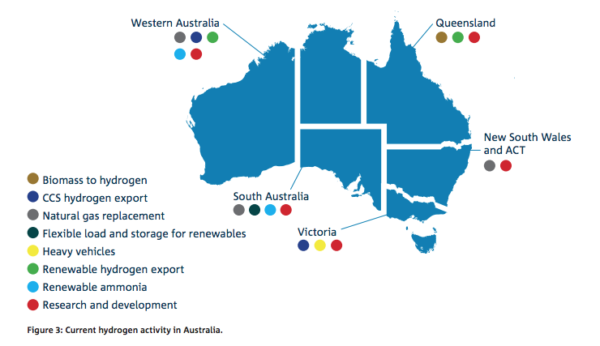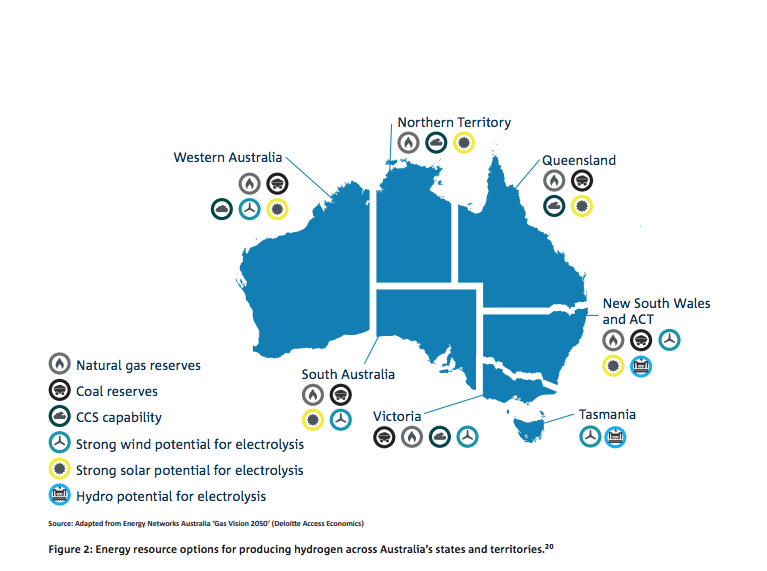As pressure mounts for countries around the world to decarbonize their economies, the interest in the production and use of hydrogen is growing.
A new report by ACIL Allen Consulting commissioned by the Australian Renewable Energy Agency (ARENA) highlights Australia’s ample opportunities to establish a foothold in the growing hydrogen export market.
“Australia has a golden opportunity to become a major exporter of hydrogen, as other countries look to transition to low carbon energy sources,” ARENA Chief Executive Officer Ivor Frischknecht said.
“If Australia can tap into our abundant wind and solar resources to produce hydrogen using renewable energy, we could export hydrogen at large scale,” he said.
Australian hydrogen exports could potentially contribute $1.7 billion to the economy annually and provide 2,800 jobs by 2030, the report finds.
The report identifies Japan, China, the Republic of Korea and Singapore as prospective markets for Australian hydrogen by 2025.
Australia has its advantages in regards to potential exports to Asia due to its location, excellent renewable energy resources, well established energy trading relationships and experience in large scale energy infrastructure construction, the report finds.
But, it should also be ready for market competition, as countries like Norway, the United States and Middle Eastern will be eager to get their slice of the cake.
Exporting hydrogen would not only benefit Australia’s economy, but also regional communities as hydrogen production facilities are likely to be located close to the supply of renewable energy, particularly large scale solar farms, the ARENA report underlines.
The time is now
According to Dr Alan Finkel, Chair of the Hydrogen Strategy Group and Australia’s Chief Scientist, hydrogen’s time has come.
In a briefing paper released by the Australian government’s Chief Scientist presented to the COAG Energy Council last week, hydrogen is described as Australia’s next multibillion dollar export opportunity.
The paper reminds that hydrogen produces no carbon emissions when burned, but only vapor and heat. When produced from water using renewable electricity, or from coal or methane combined with carbon capture and storage, it’s a close to zero-emissions fuel. With appropriate safeguards, it’s just as safe as natural gas, and just as convenient for consumers.
“In Australia, we have all the necessary resources to make hydrogen at scale: wind, sun, coal, methane, carbon sequestration sites and expertise. It’s simply never been commercially viable. Now, the economics are changing,” Dr Finkel says.
In the paper titled Hydrogen for Australia’s Future issued by Hydrogen Strategy Group, chaired by Finkel, the Chief Scientist writes: “I ask myself “why now?” given that the idea of a hydrogen economy has been seriously and frequently proposed since 1972.“
He explains that the key drivers behind the interest in hydrogen were the hundredfold reduction in the price of solar electricity in the past four decades and Japan’s commitment to be a long-term, large-scale customer for hydrogen produced through low-emissions methods.
“Japan currently imports 94% of its energy in the form of fossil fuels. To reduce its emissions, government and industry have put ambitious hydrogen uptake targets at the heart of a comprehensive energy transition plan,” Dr Finkel said.
“We’re not alone in this race. Norway, Brunei and Saudi Arabia are all boosting their credentials as future hydrogen suppliers. This is the time for Australia to stake its claim as supplier of choice not just to Japan, but to other nations like South Korea, hungry for a twenty-first century fuel,” he added.
The COAG Energy Council agreed that Dr Finkel, in close consultation with officials, will bring back a proposal for the development of a national hydrogen strategy to its December 2018 meeting.
A number of proof-of-concept trials and projects are already underway in Australia, including a hydrogen electrolyzer developed by Neoen alongside a 150 MW wind project and 150 MW solar farm in South Australia and a solar and battery hydrogen innovation hub developed by Canada’s gas major ATCO in Western Australia.

This content is protected by copyright and may not be reused. If you want to cooperate with us and would like to reuse some of our content, please contact: editors@pv-magazine.com.









Surely we are not going to start a hydrogen industry producing carbon dioxide and then sequester the CO2. Hydrogen is a clean fuel and to start out basing it on sequestration is absurd.
The logical place to make hydrogen for the future is where you have the cheapest electricity and that will probably be as near to the equator as you can get. Close to the sun with lowest atmospheric loss is what you need. If we start mucking around with sequestration do you really imagine that you can ever make hydrogen cheaper than somewhere in desert on the equator??? From Darwin we have a natural advantage in the short delivery to Japan. If we have any good wind resource near a port then electricity might be cheaper and that would be the best place.
Let’s direct our research funds to doing it the best way. I support a half billion dollars for research into electrodes for electrolysis. I think we might have to invent a sexier name for the whole field of science before we start.